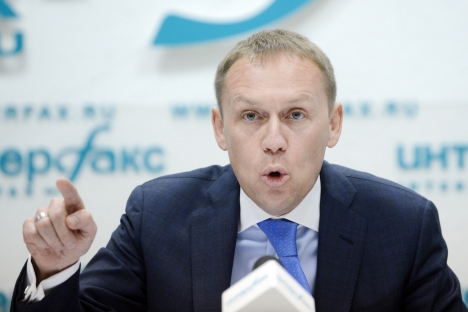
Lugovoi would no longer cooperate with British authorities over the case of Alexander Litvinenko. Source: AFP
State Duma Deputy Andrei Lugovoi said on Tuesday that he would no longer cooperate with British authorities over the case of Alexander Litvinenko, in whose poisoning death he is widely considered the prime suspect.
Lugovoi argued that he did not expect to get justice in Britain after a recent London court decision to keep most of the case's details secret and after studying a report by British police over the case.
“I have come to the conclusion that the British authorities will not give me a chance to prove my innocence,” Lugovoi, who has denied any involvement in Litvinenko's death, told reporters in Moscow.
Lugovoi's decision means that he will no longer send lawyers to the London inquest, which is set to continue this Thursday.
On March 5, the High Court judge presiding over the inquest ruled that names and most other central matters in the case should remain confidential.
The decision caused an outcry among critics, who say it dashed hopes that the long-delayed inquest would finally help solve the mystery of Litvinenko's death. Lawyers for Litvinenko's family have argued that Britain was trying to hide details of his work for its MI6 intelligence service, which showed that Russia was behind his death because London wanted to protect lucrative Russian trade deals.
Under British law, an inquest is a legal fact-finding procedure not meant to apportion guilt.
Litvinenko, who had been granted British citizenship and had become a vocal critic of President Vladimir Putin, died after someone slipped polonium-210, a rare radioactive isotope, into his cup of tea at London's Millennium hotel.
Lugovoi, a former security services officer who was among a group of three Russian businessmen who met Litvinenko that day at the hotel bar, has been at the centre of allegations that the dissident was punished for treason and that the Russian state had a hand in his killing.
At a preliminary hearing in December, a lawyer for the inquest said this was supported by evidence provided by the government. That hearing also established that Litvinenko had worked for Britain's secret service, the MI6, after moving to London in 2000.
Moscow has vehemently rejected the allegations.
Lugovoi said Tuesday that the accusations were wrong and blown out of proportion. Their sole aim, he argued, was to accuse Moscow of “state terrorism” with radioactive material.
He went on to argue that Litvinenko was not Trotsky.
“Litvinenko was not a personality of such proportions that intelligence services would hunt him across the globe with an ice pick,” he said, referring to Soviet revolutionary Leon Trotsky, who was murdered with an ice pick by a Soviet agent in Mexico in 1940.
Lugovoi also argued that British investigators failed to take into account the fact that German investigators had dropped an investigation against his associate, Dmitry Kovtun, citing a lack of evidence. Kovtun had travelled from London to Moscow via Hamburg, leaving a polonium trail behind him.
London has asked in vain for the extradition of Lugovoi, who was elected to a State Duma seat for the nationalist Liberal Democrats in 2007 and 2011, respectively.
The lawmaker on Tuesday reiterated his stance that he would not travel to Britain as a suspect in the case. “I won't play by their rules, only by my rules,” he said.
Lugovoi also repeated his accusation that exiled businessman Boris Berezovsky was linked to Litvinenko's death. He explained that this was backed up by documents provided to him by Scotland Yard.
Investigators, government officials and state-controlled media have in the past blamed Berezovsky for a host of unsolved murders, including the killings of Novaya Gazeta reporter Anna Politkovskaya, Forbes Russia editor Paul Klebnikov and Chechen human rights activist Natalya Estemirova. Berezovsky has even been accused of being behind last year's performance of the Pussy Riot punk band in a Moscow church.
Berezovsky, who lives in exile in London, has denied any wrongdoing.
The Litvinenko affair has roiled political relations between London and Moscow for years. However, the atmosphere has improved after Prime Minister David Cameron and President Vladimir Putin agreed to mend ties during a meeting at the London Olympics last year.
Foreign Minister Sergei Lavrov and Defence Minister Sergei Shoigu will visit London this Wednesday for talks with their counterparts, William Hague and Phillip Hammond.
Hague defended London's position on the affair Tuesday, telling Interfax that his government was interested in establishing justice in the case and that “Britain is the only right place to try the main suspects.”
Analysts said Tuesday that both sides were interested in limiting the political fallout of the Litvinenko affair.
Sam Greene, head of the Russia Institute at London University's King's College, argued that while Britain's ruling Conservatives wanted more pragmatic relations to improve trade relations with Russia, Moscow also wants to shore up relations with EU countries because of the strain caused by a recent deterioration in ties with the United States.
Moscow and Washington have locked horns over the U.S. Magnitsky Act, which was met by a Russian law banning adoptions by Americans and slapping new sanctions on non-government organisations.
“They have picked a major fight with the U.S. and recognize that they cannot simultaneously fight with Europe,” Greene said in a telephone interview from London.
First published in The Moscow Times.
All rights reserved by Rossiyskaya Gazeta.
Subscribe
to our newsletter!
Get the week's best stories straight to your inbox